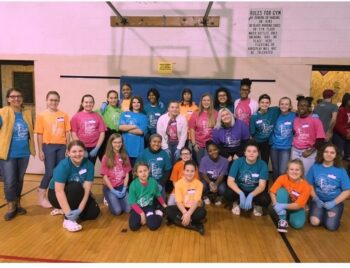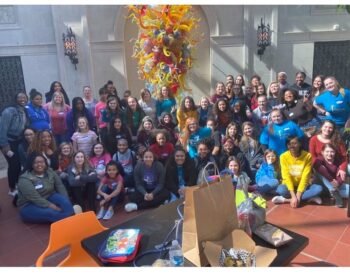
Jessica Coleman, the founder of Leading Ladies, is passionate about youth.
“I hope I don’t ever forget what it’s like to be a child. I think that’s why I’m so great at interacting with them. I remember. I remember feeling unheard. I remember feeling like high school would never end or like middle school was war. I remember feeling misunderstood and at times unloved,” Coleman says.
Mother of three sons, Coleman found herself doing impactful things with other people, while her oldest son was staying home. It was time for Leading Ladies to evolve into The Legacy Mentoring Group, LLC, a youth consulting company.
“I was born in Marion but moved around a lot until graduating from Harding. I wanted a place I could go when I restarted,” says Coleman. “My family and sons are here, I love our community. Staying in Marion and growing our future is one of the reasons Leading Ladies and Legacy were created.”
“Legacy is the fruit grown from Leading Ladies. I am now able to reach more than just young women but young men and staff as well. I am ultimately able to help entire school communities,” says Coleman. “My only goal is to create a place where children feel free and safe, and school is where kids spend most of their time. It’s a ‘home base’ of sorts. No matter what goes on outside of the building, children should not only hear that it’s safe, that they’re safe, but they should feel it too – as should teachers and all staff. That’s what Leading Ladies did. That’s what The Legacy will continue to do.”
 Legacy Mentoring Group believes that cohesion, compassion, and cooperation are essential in creating a positive and welcoming environment for students, as well as the staff.
Legacy Mentoring Group believes that cohesion, compassion, and cooperation are essential in creating a positive and welcoming environment for students, as well as the staff.
The mission of Legacy Mentoring Group is to provide school communities with engaging alternatives to further encourage the growth and wellness of the students and staff.
“I knew I wanted to build this program, and I knew I wanted it to be in schools. With Legacy, I find a way to serve everybody,” says Coleman of her vision.
“The Legacy Mentoring Group is built on the three S’s of cohesion being the student, the staff, and the school community,” Coleman notes. “None of them can thrive unless they’re all successful.”
When Coleman partners with school administration for the first time, they discuss the problem areas in the school regarding students, issues staff are having, and something the team would like to achieve as a school community. She then has similar conversations with staff and students.

Participation is a choice and there are guidelines. Legacy Mentoring Group meets during the school day for a Social-Emotional Relational Session once a month, and another Friday, members work on their Legacy project.
“People tend to care more about things when they’ve built it when they have ownership,” Coleman says of the Legacy projects. “The students that are a part of the program will decide on something they create for the next class behind them, their legacy.”
“People always think their legacy has to be a building or a statue, but legacy can be a person,” notes Coleman.
Staff also have a legacy project, with an understanding that staff is already stretched thin. When asking teachers to do more, Coleman understands they can be resistant. The staff legacy project includes an incentive, and details are solidified with each school.
Additionally, the school community has a legacy project. Anyone who is part of the school is included. The project is meant to be encouraging and for everyone to feel connected.
Coleman says, “It starts in the classroom. These legacy projects help children have a sense of accountability and ownership.”
The program is able to be utilized in any school, anywhere in the country. The intent is to help with turnover or burnout, and connection.


















